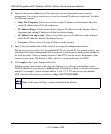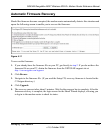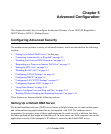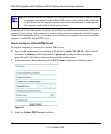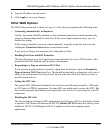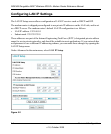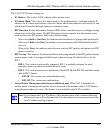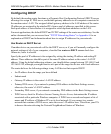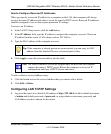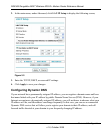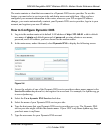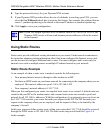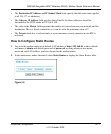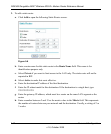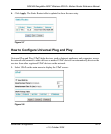
DG834N RangeMax NEXT Wireless ADSL2+ Modem Router Reference Manual
5-6 Advanced Configuration
v1.0, October 2008
Configuring DHCP
By default, the modem router functions as a Dynamic Host Configuration Protocol (DHCP) server,
allowing it to assign IP, DNS server, and default gateway addresses to all computers connected to
the modem router’s LAN. The assigned default gateway address is the LAN address of the router.
IP addresses are assigned to the attached PCs from a pool of addresses specified in this screen.
Each pool address is tested before it is assigned to avoid duplicate addresses on the LAN.
For most applications, the default DHCP and TCP/IP settings of the router are satisfactory. See the
online document that you can access from “TCP/IP Networking Basics” in Appendix A for an
explanation of DHCP and information about how to assign IP addresses for your network.
Use Router as DHCP Server
If another device on your network will be the DHCP server, or if you will manually configure the
network settings of all of your computers, clear the Use router as DHCP server check box.
Otherwise, leave it selected.
Specify the pool of IP addresses to be assigned by setting the starting IP address and ending IP
address. These addresses should be part of the same IP address subnet as the router’s LAN IP
address. Using the default addressing scheme, you should define a range between 192.168.0.2 and
192.168.0.254, although you might want to save part of the range for devices with fixed addresses.
The router delivers the following settings to any LAN device that requests DHCP:
• An IP address from the range you have defined
• Subnet mask
• Gateway IP address is the router’s LAN IP address
• Primary DNS server, if you entered a primary DNS address in the Basic Settings screen;
otherwise, the router’s LAN IP address
• Secondary DNS server, if you entered a secondary DNS address in the Basic Settings screen
• WINS server, short for Windows Internet aming Service Server, determines the IP address
associated with a particular Windows computer. A WINS server records and reports a list of
names and IP address of Windows PCs on its local network. If you connect to a remote
network that contains a WINS server, enter the server’s IP address here. This allows your PCs
to browse the network using the Network Neighborhood feature of Windows.



